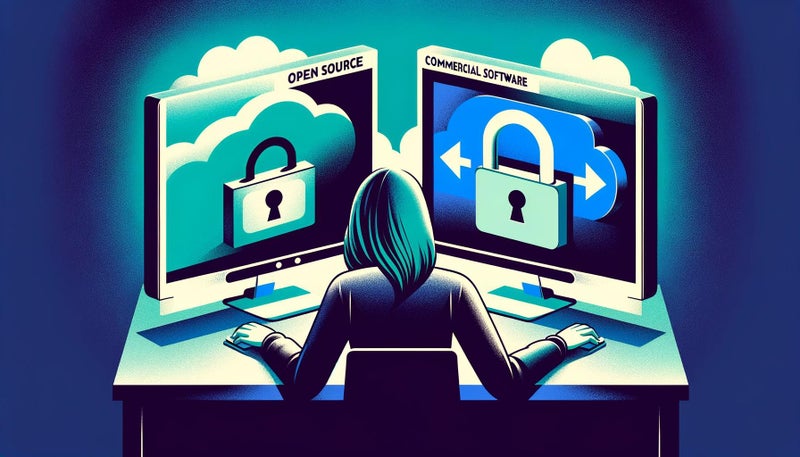Contents
- Open Source: The Power of Collaboration and Customization
- Commercial Software: Reliability and Support in the Fast Lane
- Your Workflow and Project Needs Lead the Way
- Embracing a Strategic Approach
Need help choosing between open source vs commercial software? Both offer distinct advantages and challenges, and understanding them is key to making the best choice for your remote team.
From customization to integration and support, this guide breaks down the core differences between open source vs commercial software to ensure your team is working as effectively as possible.
Open Source: The Power of Collaboration and Customization
Open source software, often referred to as "free and open-source software" (FOSS), is characterized by its publicly accessible source code.
This allows developers to freely modify, distribute, and improve the software, creating a vibrant community of collaboration and innovation.
It’s popular, too.
A staggering 82% of IT leaders are more likely to select a vendor who contributes to the open source community.
Why? Let's delve into the key benefits of open source for remote developers:
- Unmatched Customization: Open source grants you the freedom to tailor the software to your exact needs and preferences. Whether you're building a custom web application or experimenting with a new data analysis tool, the ability to modify the code unlocks incredible flexibility.
- Cost-Effectiveness: In an era of tight budgets, the free nature of open source software makes it a compelling option for independent developers and startups. This can significantly reduce development costs, allowing you to focus on building your project without financial constraints.
- Community Support: Open source thrives on a collaborative spirit. A vast network of developers actively contributes to and supports open source projects, providing valuable resources and assistance through online forums, documentation, and troubleshooting guides. This collective knowledge base can be invaluable when encountering challenges or seeking new insights.
- Transparency and Security: With the source code readily available, open source fosters a high degree of transparency. You can scrutinize the code's functionality and security, ensuring it aligns with your ethical and security standards. This transparency also allows for rapid identification and patching of vulnerabilities, contributing to the overall security of the software.
Commercial Software: Reliability and Support in the Fast Lane
While open source offers unique advantages, commercial software provides a different set of benefits, particularly suited for specific development needs.
It’s also on the rise, with revenue in the software market projected to exceed $350 billion in 2024.
What it offers:
- Dedicated Support and Maintenance: Commercial software vendors typically offer dedicated support teams and regular updates, ensuring smooth operation and addressing issues promptly. This can be important for high-stakes projects or long-term development cycles where stability and ongoing maintenance are paramount.
- Integrated Solutions: Many commercial software solutions provide comprehensive and pre-configured environments, streamlining your development process by eliminating the need to manage multiple disparate tools. This can significantly improve efficiency and reduce time spent on configuration and setup.
- User-Friendly Interfaces: Commercial software is often designed with user-friendliness in mind, featuring intuitive interfaces and well-documented features. This can be a major benefit for remote developers, as it minimizes the learning curve and allows you to focus on your core development tasks.
- Clear Licensing and Compliance: Purchasing commercial software grants you a clear license that outlines your rights and obligations, ensuring legal compliance and intellectual property protection. This is particularly important for projects with strict licensing requirements or those involving sensitive data.
Your Workflow and Project Needs Lead the Way
Ultimately, the choice between open source vs commercial software hinges on your specific circumstances and priorities.
Here are some key factors to consider:
- Project Requirements: What are the unique needs and functionalities your project demands? Open source might be ideal for experimentation or customization, while commercial software can offer a more comprehensive solution for complex or long-term projects.
- Budget: Open source offers a significant cost advantage, while commercial software comes with upfront licensing fees and potentially ongoing support costs. Weigh your budget constraints against the value proposition of each option.
- Technical Expertise: If you possess the technical skills and desire for customization, open source can be empowering. But if you value user-friendliness and dedicated support, commercial software is a better fit.
- Collaborative Culture: Do you thrive in collaborative environments? Open source communities offer a unique opportunity to contribute and learn from others. Conversely, commercial software provides a more structured and vendor-supported environment.
Embracing a Strategic Approach
Understanding the strengths and limitations of both open source and commercial software allows you to make a strategic decision that aligns with your individual needs and project goals.
Don't be afraid to experiment and find the tools that empower you to be a productive and successful remote developer.
The ideal choice between open source vs commercial software will depend on your specific project needs.
The choice isn’t always a binary one - you can leverage a combination of both to create a customized development environment that perfectly suits your remote team.






